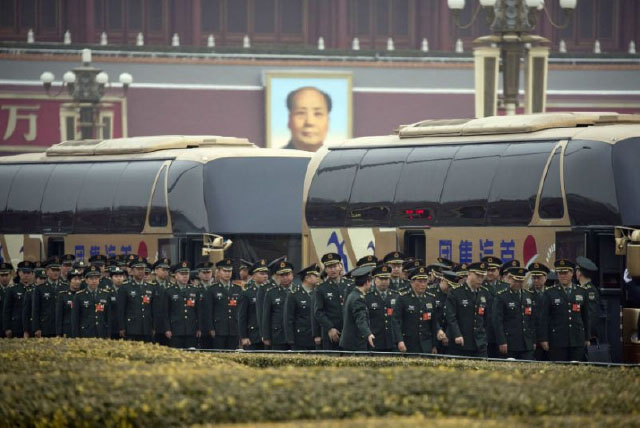BEIJING — China’s defense budget will rise 8.1 percent to 1.1 trillion yuan ($173 billion) this year as the country prepares to launch its second aircraft carrier, integrate stealth fighters into its air force and field an array of advanced missiles able to attack air and sea targets at vast distances.
The figure released in a report Monday to the ceremonial National People’s Congress is an increase in the growth rate from last year, when finance ministry officials said the budget was rising 7 percent to 1 trillion yuan ($151 billion).
Years of double-digit percentage growth have given China the world’s second-largest defense budget after the United States, which is in a class of its own with a proposed budget of $716 billion for next year.
“We will stick to the Chinese path in strengthening our armed forces, advance all aspects of military training and war preparedness,” Premier Li Keqiang said as he read a report to nearly 3,000 delegates at the Great Hall of the People.
The armed forces will “firmly and resolutely safeguard national sovereignty, security and development interests,” Li said.
China has the world’s largest military by number of personnel, but Li said the country had “basically completed” the target of reducing the size of the armed forces by 300,000 troops. That would leave the People’s Liberation Army’s strength at around 2 million troops.
But China’s defense spending as a share of GDP and the budget remains lower than that of other major nations, Zhang Yesui, a spokesman for the legislature, said Sunday.
This year’s defense budget comes to about 1.3 percent of last year’s GDP of 82.7 trillion yuan ($12.4 trillion).
Analysts don’t consider China’s publicly announced defense spending to be entirely accurate since defense equipment projects account for a significant amount of “off book” expenditures. Noting that this year’s increase was roughly the same as last year’s when adjusted for inflation, Shanghai military expert Ni Lexiong said China was seeking to avoid a full-on arms race based on quantity of weapons, choosing instead to invest in high-tech systems and training. (AP)
Home » World » No. 2 Spender China to Boost Defense Spending In 2018
No. 2 Spender China to Boost Defense Spending In 2018

